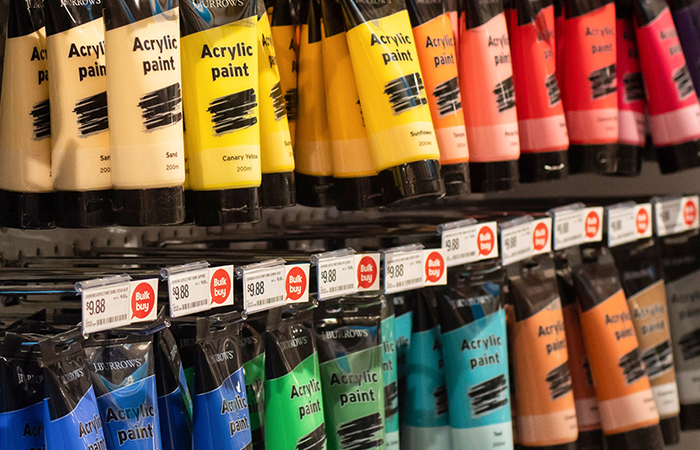Walmart's RFID Mandate is Lighting the Way for Retail
Walmart is requiring more and more of its suppliers' products to carry RFID tags. Its mandate is having a ripple effect on retail strategies worldwide.
As the largest retailer in the world, Walmart has significant influence on other players in the retail space — and beyond.
In 2019, Walmart announced it would require apparel and footwear items sold in its stores to carry RAIN RFID tags, later expanding its mandate to toys, consumer electronics, home goods, and more. After finding success in tagging these more traditional merchandise categories, Walmart expanded RAIN RFID tagging to additional departments, including books, crafts, and media/gaming, as well as home-and-garden categories such as paint and hardware, with plans to add even more categories in the future.
Walmart's tagging mandates are lighting the way for the entire retail industry — and getting started with an RFID tagging program is easier than ever. From stores to brands, from manufacturers to packaging suppliers, enterprises around the world — even those without connections with Walmart — must consider the role RAIN RFID could play in their operations.

RAIN RFID allows retailers like Walmart to precisely track inventory and quickly restock shelves, with cost-saving implications and logistical improvements that boost efficiency and customer satisfaction. Tagging products with RAIN RFID chips like those made by Impinj allows Walmart to monitor exactly what merchandise is on its shelves or in backrooms, and track items in real time as they move through supply chains.
How Walmart's RFID mandate is setting a new standard for retail
Walmart’s tagging program began life as a mandate, but it is also resulting in an emerging standard for other retailers to follow as the industry increasingly adopts RAIN RFID. Walmart has worked closely with the Auburn University RFID Lab’s ARC program to develop performance specifications and qualification processes for RAIN RFID tags that will be used in Walmart stores.
Other retailers can follow this same approach when developing their own tagging programs. Retailers that are already using RAIN RFID tags for some merchandise categories – like Nordstrom, which announced a similar program in 2022 – can also get a head start on any future program expansions by referencing the ARC specifications and the approved tags that were developed for the Walmart mandate.
ARC-qualified tags meet performance requirements specific to the merchandise categories they’re used on, giving retailers and brand manufacturers confidence when choosing tags for specific items. For example, packaged toys such as board games or puzzles might use an adhesive RAIN RFID label that’s a similar size and shape as an existing barcode. But a hardware item may need a tag that’s designed to work on or around metal, and therefore may need a different size or shape for optimal performance.
How Impinj enables retail transformation
Impinj-based RAIN RFID tags reliably deliver the high performance, fast inventory, and long-distance reading capabilities necessary for the success of a large-scale RAIN RFID deployment across multiple merchandise categories in retail. Tags are the foundation of a successful RAIN deployment; the many Impinj-based tags that meet ARC specifications enable retailers to meet the requirements of the Walmart tagging program or other programs based upon it.
Tags and labels powered by Impinj’s newest RAIN RFID tag chips allow tags to be smaller than ever, which can be an important consideration for many items — like art supplies or cosmetics.
At Impinj, we continue to innovate to bring the highest-performing tag chips with exclusive features to the retail sector. For example, Impinj AutoTune™ automatic tuning allows a tag to recalibrate itself to receive maximum power during operation. And Impinj Protected Mode provides a fast and secure method for making tag data invisible to RAIN RFID readers after an item has been purchased.
[Curious about more RAIN RFID deployments in retail? Subscribe to the Impinj blog.]
Rethinking retail with RAIN RFID
Walmart’s RAIN RFID expansion into new merchandise categories is part of an ongoing digital transformation across the industry. Retail experts say Walmart is doubling down on RFID to improve efficiency as it competes with online retailers like Amazon and strives to capture reinvigorated foot traffic after the Covid-19 pandemic.
It appears big-box retail’s embrace of RAIN RFID will eventually widen to include health and beauty products, and even grocery items. While retailers worldwide are already using RAIN RFID to power their digital transformations, Walmart’s mandate expansion — and its work creating tag performance standards — showcases the power of the technology, sets an example for the industry, and illuminates a pathway for adopting and deploying RAIN RFID solutions.
And those are not the only potential impacts of Walmart’s tagging program. As brands that sell through Walmart begin tagging their products at the factory to comply with Walmart’s requirements, a natural next step could be for those companies to explore the benefits of RAIN RFID in their own manufacturing, inventory, and supply chain operations.
“RFID technology is becoming the standard,” Stefan Otte, vice president for global real estate and partner retail at Levi Strauss & Co., told the world in 2020. “There will be no future in retail without RFID.” Now, three years later, Walmart and its suppliers are shining a light on what that future will look like, built in part on Impinj products and technology.
To learn more about the Walmart tagging program, the benefits of RAIN RFID in retail, or how to get your own deployment started, contact us at Impinj. We can connect you with Impinj partners that can develop solutions tailored to your needs.
- Article tagged as:
Tuesday, January 9, 2024
ABOUT THE AUTHOR
.png?width=400&height=400&ext=.png)
Carl Brasek
Vice President, Endpoint IC Sales
Carl Brasek oversees Impinj’s initiative to drive worldwide RAIN RFID adoption across all kinds of industries.
Sign Up for the latest news
